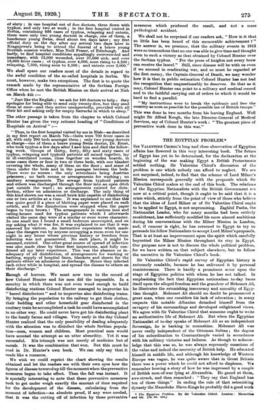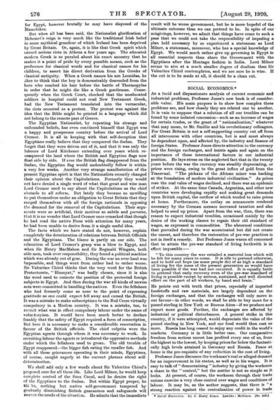THE EGYPTIAN PROBLEM.*
Six VALENTrNE CHIROL'S long and close observation of Egyptian affairs has flowered in this very interesting book. The future of Egypt has yet to be determined, for the declaration at the beginning of the war making Egypt a British Protectorate settled nothing. Sir Valentine Chirol's discussion of the problem is one which nobody can afford to neglect. We are not surprised, indeed, to find that the scheme of Lord Milner's Mission corresponds generally with the proposals which Sir Valentine Chirol makes at the end of this book. The relations of the Egyptian Nationalists with the British Government are now at a critical point, though it ought to be said that it is a crisis which, strictly from the point of view of those who believe that the ideas of Lord Milner or of Sir Valentine Chirol ought to be applied to Egypt, is not unpromising. Zaghlul Pasha, the Nationalist Leader, who for many months had been entirely recalcitrant, has sufficiently modified his more absurd ambitions during his conversations with the Milner Mission in London, and, if rumour is right, he has returned to Egypt to try to persuade his fellow Nationalists to accept Lord Dinner's proposals. That is at least an improvement upon the spirit which carefully boycotted the Milner Mission throughout its stay in Egypt. Our purpose now is not to discuss the whole political problem, for we have written on that subject elsewhere, but to follow the narrative in Sir Valentine Chirol's book.
Sir Valentine Chirol's rapid survey of Egyptian history is extremely readable, because he has enlivened it by personal reminiscences. There is hardly a prominent actor upon the stage of Egyptian politics with whom he has not talked. In emphasizing the fact that Egyptian nationalism to-day bases itself upon the alleged freedom and the grandeur of Mehemet Ali, he illustrates the astonishing inaccuracy and unreality of Egyp-
tian thought. Mehemet Ali should no doubt be pronounced a great man, when one considers his lack of education ; in many respects this notable Albanian detached himself from the savagery of his surroundings and developed enlightened views. We agree with Sir Valentine Chirol that someone ought to write an authoritative life of Mehemet Ali. But when the Egyptian Nationalist of to-day speaks of Mehemet Ali as an independent Sovereign, he is basking in moonshine. Mehemet All was never really independent of the Ottoman Sultan ; the degree of his subordination to Constantinople varied in accordance with his military victories and failures. As though to acknow- ledge that this was so, he was always supremely conscious of the value and indeed the necessity of British help. He educated himself in middle life, and although his knowledge of Western Europe was vague, he was quite aware that in Great Britain
there was a power which he could not afford to displease. We remember hearing a story of how he was impressed by a couple
of British men-of-war lying at Alexandria. He gazed at them, awe-struck, and then remarked : " They say that England has ten of those things." In ending the rule of that astonishing dynasty the Mameluke Slave-Kings he probably did a good work
• The Egyptian Problem. By Sir Valentine Chirol. London : Macmillan and Co. Us. 6d. net.)
for Egypt, however brutally he may have disposed of the Mamelukes.
But when all has been said, the Nationalist glorification of Mehemet's reign is very much like the traditional Irish belief in some mythical grandeur of which Ireland has been deprived by Great Britain. Or, again, it is like that Greek spirit which caused serious riots in Athens a few years ago. The educated modern Greek is so puzzled about his exact ancestry that he makes it a point of pride by every possible means, such as the preference for classical words and for classical names for his children, to assert his direct derivation from the Greeks of classical antiquity. When a Greek names his son Leonidas, he ikes to think that the boy is demonstrably descended from the hero who combed his hair before the battle of Thermopylae in order that he might die like a Greek gentleman. Conse- quently when the Greek Court, shocked that the uneducated soldiers in hospital could not read New Testament Greek, had the New Testament translated into the vernacular, the riots occurred as a protest. The protest was against the idea that the Bible might be printed in a language which did not belong to the remote past of Greece.
The Egyptian Nationalist, by repeating his strange and unfounded beliefs, has even convinced himself that Egypt was a happy and prosperous country before the arrival of Lord Cromer. It is all in keeping with that self-deception that Egyptians really believe that they conquered the Sudan. They forget that they were driven out of it, and that it was only the labours of Lord Kitchener extending over years which re- conquered the land where the British and Egyptian flags now float side by side. If ever the British flag disappeared from the Sudan, the Egyptian flag would undoubtedly follow it within a very few weeks. Another very strange manifestation of the present Egyptian spirit is that the Nationalists recently changed their opinion about the Capitulations. Formerly they would not have denied a single word of what that great and wise man Lord Cromer used to say about the Capitulations as the chief obstacle to all reform. But lately they became so unwilling to put themselves under an obligation to Great Britain that they ranged themselves with all the foreign nationals in opposing the demand for the removal of the Capitulations. Their argu- ments were so artificial, their motives so subtle and perverse, that it is no wonder that Lord Cromer once remarked that though he had read the native Press with attention for many years, he had been unable to derive from it a single useful idea.
The facts which we have stated do not, however, explain completely the deterioration of relations between British Officials and the Egyptians. The blame is partly on our side. The relaxation of Lord Cromer's grasp was a blow to Egypt, and when Sir Henry MacMahon and Sir Reginald Wingate, both able men, took over responsibility, they found a political machine which was already out of gear. During the war an over-haul was impossible, and things went from rather bad to rather worse. Sir Valentine Chirol thinks that the very word for the British Protectorate, " Himayat," was badly chosen, since it is also the word used to connote the position of the protected foreign subjects in Egypt. And then during the war all kinds of unwise acts were committed in handling the natives. Even the fellaheen who had formerly come as near to the point of expressing gratitude as one could expect fell away and cursed the British. It was a mistake to make subscriptions to the Red Cross virtually compulsory in a Moslem country. It was a mistake, too, to recruit what was in effect compulsory labour under the name of voluntaryism. It would have been much better to declare frankly that the safety of Egypt required a form of conscription. But here it is necessary to make a considerable reservation in favour of the British officials. The chief culprits were the Egyptian agents through whom it was necessary to work. In recruiting labour the agents re-introduced the oppressive methods under which the fellaheen used to groan. The old trouble of Egypt reappeared—the bigger fish eating the smaller fish. And with all these grievances operating in their minds, Egyptians, of course, caught eagerly at the current phrases about self- determination.
We shall add only a few words about Sir Valentine Chirol's proposed cure for all these ills. Like Lord Milner, he would keep complete control of the Suez Canal, and he denies the right of the Egyptians to the Sudan. But within Egypt proper, he thi ks, nothing but native self-government tempered by gradually diminishing British guarantees and safeguards will answer the needs of the situation. He admits that the immediate
result will be Worse government, but he is more hopeful of the ultimate outcome than we can pretend to be. In spite of our • misgivings, however, we admit that things have come to such a pass that we could not take the responsibility of impeding a plan held necessary by so experienced a statesman as Lord Milner, a statesman, moreover, who has a special knowledge of Egypt. We would much rather give up governing in Egypt in all essential respects than share the Government with the Egyptians after the Montagu fashion in India. Lord Milner seems to aim at a much smaller degree of dualism than Sir Valentine Chirol contemplates, and we are sure he is wise. If the cut is to be made at all, it should be a clean cut.



































 Previous page
Previous page